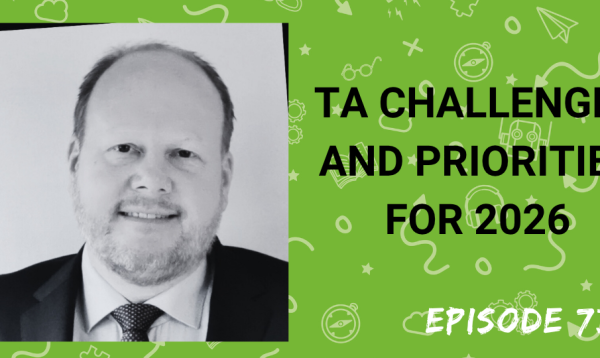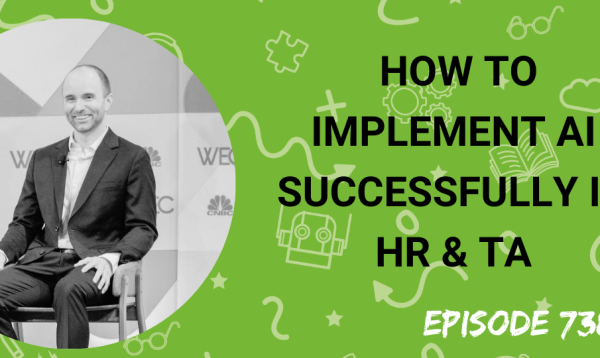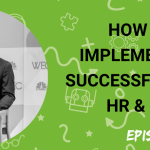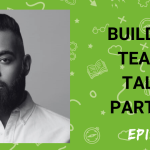The current gender balance in the tech workforce is a well-documented issue and something that sadly is still a massive problem for employers. Back in 2015, I interviewed Sinead Bunting about the then newly created Tech Talent Charter, an initiative designed to bring together industries and organizations to drive diversity and address gender imbalance in technology roles. Four years on, it was great to catch up with Sinead again to see how things have progressed and what companies are proactively doing to solve this problem.
In the interview we discuss:
- The core principles of the Tech Talent Charter
- The power of sharing data
- What recruiting best practices employers should be following to improve gender balance
- The importance of language
- Retention and belonging
- Flexible working and shared parental leave
- Unconscious bias
- Ambassadors, Allies, and Advocates
Sinead also talks about the future of the Tech Talent Charter and shares details on how employers can get involved.
Subscribe to this podcast in Apple Podcasts
Transcript:
Matt Alder [00:00:00]:
Support for this podcast comes from Smart Dreamers. Smart Dreamers helps your HR team to accelerate talent acquisition with unique end to end marketing automation software built specifically for recruitment. Companies from L’Oreal and UiPath to Temenos and Jempack use smart dreamers to automate their talent acquisition channels and processes. Their clients are powering talent acquisition at a fraction of the cost and generating employer brand gravity in the process. This means more better candidates and lower cost per hire. No matter what recruitment software you’re using. Smart Dreamers integrates with all of them, a perfect fit for your software ecosystem. If you want more better candidates at a fraction of the cost, visit www.smartdreamers.com. that’s www.smartdreamers.com to learn more and schedule a demo.
Matt Alder [00:01:17]:
Hi everyone, this is Matt Alder. Welcome to episode 196 of the Recruiting Future podcast. The gender balance in the tech workforce is a well documented issue and something that’s sadly still a massive problem for employers. Back in 2015, I interviewed Sinead Bunting about the then newly created Tech Talent Charter, an initiative designed to bring together industries and organisations to drive diversity and address gender imbalance in technology roles. Four years on, it was great to catch up with Sinead again to see how things have progressed and what companies are proactively doing to solve this problem. Hi Sinead and welcome to the podcast.
Sinead Bunting [00:02:02]:
Hi Matt, how are you today?
Matt Alder [00:02:04]:
I’m very good, thank you. Very good indeed. Could you just introduce yourself and tell everyone what you do?
Sinead Bunting [00:02:10]:
So my name is Sinead Bunting, I’m a marketing professional and I’m also the.
Sinead Bunting [00:02:15]:
Creator and co founder of of a diversity initiative called the Tech Talent Charter.
Matt Alder [00:02:21]:
And can you tell us a little bit about the Tech Talent Charter, what it is, how it came about and what its objectives are?
Sinead Bunting [00:02:28]:
Yeah, sure.
Sinead Bunting [00:02:29]:
So essentially it’s an industry wide initiative to drive greater diversity in the world of tech, but the tech workforce. So it’s not just about big tech companies, it’s any type of tech role across industries. We kind of set it up a few years ago and the inspiration behind it, if you will, was actually Caitlin Moran and she’s a comedian and a writer. So maybe a bit of a strange one for a tech talent initiative, but she launched her book a few years ago in Union Chapel in Islington in London and she said one thing, which was if 90% of coders are men, owning and developing the language of the future, women won’t be part of the conversation. And it kind of really highlighted the challenge that we face in the tech workforce. Only 17% of the tech workforce is female. And of course females make up half the population. And it’s such a critical and fundamental element of today and the future. So I. The kind of, what we wanted to do was come together to collectively move the dial and change that. And I think what we recognized back then is and still is, there’s so many amazing initiatives driving diversity in tech, but there wasn’t sufficient change. And I kind of really felt that we can do our own thing here. At the time I was working at.
Sinead Bunting [00:04:08]:
Monster, we could do our own thing.
Sinead Bunting [00:04:09]:
And we did do initiatives and it’s really important that folks do that, but to really make a difference, you know, collectively people are stronger. And that’s the very ethos of the tech talent charter. The other kind of fundamental part of it is that we weren’t about reinventing the wheel and kind of, you know, showing, you know, folks, this is how you should do this, do that. We were all about joining the dots and kind of being the kind of linchpin, the kind of, you know, entity that’s kind of drawing the whole ecosystem together and signposting all the amazing things that are happening out there. So that’s the kind of, the main principle is to drive greater diversity in the tech workforce.
Matt Alder [00:04:47]:
And how, how does that actually work in practice to people sign up to the charter? What, what’s involved? What are the sort of specifics around it?
Sinead Bunting [00:04:56]:
Yeah, so it is a charter. And the charter has certain principles, protocols. And the main principles are, number one, it’s what has been called the Rooney Rule. And essentially you may be familiar with that, it’s from the NFL football, where in NFL football there’s lots of African American superstars, but very few actually go on to become coaches. And Rooney is a guy who owned the Pittsburgh Steelers football club.
Sinead Bunting [00:05:32]:
He recently died, I think it was last year.
Sinead Bunting [00:05:34]:
And his whole thing was we have to get more diversity in coaching folks who are leading these football teams. And he wasn’t saying there should be affirmative action, but his whole kind of principle was you don’t have to recruit a non white person, but you have to at least have different folks in the recruitment process to kind of mix it up, to get different diversity at the very top of the funnel. So that was the principle. So that’s the kind of main thing of the tech talent charter was you don’t have to recruit a Woman. We know the pipeline, you know, isn’t, you know, full of women, but you do, where possible, have to consider recruiting one or trying to, you know, you know, speak to one and interview one.
Sinead Bunting [00:06:21]:
So that was one of the main principles.
Sinead Bunting [00:06:23]:
The second main principle was you have to, you know, try your best to.
Sinead Bunting [00:06:28]:
Adhere to recruitment and retention best practices.
Sinead Bunting [00:06:31]:
So in terms of, you know, writing job ads, in terms of the interview.
Sinead Bunting [00:06:34]:
Process, all the kind of different principles.
Sinead Bunting [00:06:37]:
That will go on to talk about. And the third really big pillar of.
Sinead Bunting [00:06:41]:
The Tech Talent Charter was data.
Sinead Bunting [00:06:43]:
The kind of amazing lady that helped kind of, you know, set it up.
Sinead Bunting [00:06:47]:
With me, Amali D’Alvis.
Sinead Bunting [00:06:48]:
She’s CEO of Code First Girls. She had this lovely kind of saying, which is what gets measured, gets done. And we were very kind of keen from the very outset to understand what we’re dealing with. So people who sign up to the charter, what is your ratio of folks.
Sinead Bunting [00:07:06]:
In your tech workforce?
Sinead Bunting [00:07:07]:
How many women do you have in the tech workforce? And the reason for that was. And it’s anonymized, we’re not there to name and shame people. You know, everyone’s a bit pants at this. It’s really to kind of understand the benchmarks, and the reason for that is understanding what we’re dealing with. But also it means that in a.
Sinead Bunting [00:07:26]:
Year’S time or two years time, we.
Sinead Bunting [00:07:28]:
Can see, have we made any progress?
Sinead Bunting [00:07:30]:
Has this initiative actually worked and made a difference?
Sinead Bunting [00:07:32]:
Because that’s what it’s all about. We want to make a difference. Now you asked, what do you do? Well, what we’ve kind of been focusing on for the last couple of years, 18 months, certainly, is getting people to sign up to the charter and adhere and kind of aspire to all those principles. And so far We’ve got over 300 signatories, including the likes of EY, Cancer Research, Global Radio, Microsoft, Accenture, all these folks and the UK government and the.
Sinead Bunting [00:08:08]:
Whole of the UK government have signed.
Sinead Bunting [00:08:10]:
Up to the charter and its principles, which has been fantastic.
Matt Alder [00:08:14]:
You mentioned data as being a core principle there. Is there any sort of interesting things that the data has shown you? Is there anything that you can sort of share to date from the people that have signed up?
Sinead Bunting [00:08:28]:
Sure. So we launched our first report in January at our annual event. And what was heartening to see was that all our signatories, in aggregate, 27% of their workforce is female, so well above the average of 17%. And I guess, you know, that’s probably not too surprising because these are folks who care enough to actually sign up and do something about it.
Sinead Bunting [00:08:57]:
So that was good to see.
Sinead Bunting [00:08:59]:
The second thing that really stood out certainly for us was that the small.
Sinead Bunting [00:09:05]:
And medium sized companies were the organizations.
Sinead Bunting [00:09:08]:
Who were really leading the charge and were really kind of being really good at the progress. So they were much better than big corporates. And I guess again they’re probably, they’ve.
Sinead Bunting [00:09:19]:
Got the ability to be a bit.
Sinead Bunting [00:09:20]:
More agile and to kind of set their culture from the outset. So that was good to see as well that, you know, you don’t need a big HR functions to make a difference. Small and medium sized companies are making the difference and are doing a better job at it at the moment.
Matt Alder [00:09:36]:
So digging into some of the best practices that you mentioned when it comes to recruiting and retention. What should employers be thinking about when it comes to gender balance in this particular area?
Sinead Bunting [00:09:49]:
There’s a number of initiatives that you.
Sinead Bunting [00:09:52]:
Can make the difference and this won’t.
Sinead Bunting [00:09:55]:
Be a surprise to many of your listeners.
Sinead Bunting [00:09:57]:
And it’s really how you portray yourself and communicate is fundamental. And the key element of recruitment is the simple job posting. And we do know the kind of, we do know that women have an imposter syndrome. We do know that they maybe lack.
Sinead Bunting [00:10:17]:
The confidence and we know that kind.
Sinead Bunting [00:10:18]:
Of age old stat that I think it is. You know, women will apply for a job if they have 90% of the skills, whereas men, males, men will go for it if they have 60%. And the language that you use in job postings is really influential.
Sinead Bunting [00:10:37]:
So instead of having those essential requirements.
Sinead Bunting [00:10:40]:
You know, maybe make them a bit more kind of transferable or aspirational. Secondly, it’s the language you use that kind of can really put off folks, whether it’s, you know, let’s work hard, play hard, let’s knock it out of the ballpark, all these kind of sporting analogies which are very subtle but are signals to, you know, females that this.
Sinead Bunting [00:11:04]:
Place isn’t maybe where I will flourish.
Sinead Bunting [00:11:06]:
Or where I belong. So we know that there’s this fantastic tool, a piece of tech by Kat Matfield, a female computer programmer. And it’s essentially where you can paste in your copy for your job posting. And it tells you if you’re using overly masculine words or if it’s neutral or indeed if it’s, you know, using lots of female words. So there’s and she, that’s open source, you can go and use that. And one of the initiatives of the tech talent charter is to try and get all our recruitment signatories and companies to start utilizing that and to kind of, that’s the first, you know, quite easy step is to kind of just be really mindful of how you portray yourself and what language you use to communicate. And I’ve been to a number of events where some organizations have said that once they’ve started doing that, there has been a significant change.
Sinead Bunting [00:12:02]:
So that’s one element, Another one is.
Sinead Bunting [00:12:04]:
And I speak to different people and.
Sinead Bunting [00:12:06]:
Some companies approach them and go, I.
Sinead Bunting [00:12:08]:
Don’T know what’s going on. You know, we’re not really getting that diversity kind of come in and, you know, applying for jobs and then you look at their website and it’s, it’s all, it’s not particularly diverse and it’s, you know, beanbags and kind of lots of maybe non diverse folks there. So again, visually, you know, what can you do? And I actually, I really love the. There was an initiative that was launched, I think it was about two months ago, and I think there’s an organization called UK Black Tech and they have released a kind of library of stock photography featuring, you know, black professional black people. And, you know, it’s free for everyone, so, you know, you can use it. So there’s no excuse not to be using kind of different types of groups and folks in your imagery. And of course there’s the whole thing. What you can’t see can’t be. So, you know, even the language and the visuals are really important, but more.
Sinead Bunting [00:13:07]:
Importantly can make that difference.
Matt Alder [00:13:09]:
So moving on to the retention part, I’m imagining that’s just as fundamental when it comes to this.
Sinead Bunting [00:13:14]:
Yeah. Whenever, you know, we first started looking into this a few years ago, what we found was that the females that do arrive at the tech workforce, they tend to leave in quite significant numbers as well. And that’s a result of, of the environment. So the environment’s not really kind of conducive to them. It’s not somewhere where they feel they can flourish. So kind of facilitating an environment where.
Sinead Bunting [00:13:40]:
They feel like they belong and they.
Sinead Bunting [00:13:41]:
Feel like they can be themselves and that meets their life needs is really fundamental. And a big part of this is flexible working and shared parental leave. I have to say, I do not believe we will ever get gender equality.
Sinead Bunting [00:13:57]:
In the world until we have shared parental leave.
Sinead Bunting [00:14:01]:
It’s a huge thing. And you know, to me and you know, to everyone at the Tech Talent Charter, you know, shared parental leave, you know, if you have it as a policy in your HR handbook, that is not you, you know, embedding that in your culture. You know, culture is what you reward and what you censure, you know, and.
Sinead Bunting [00:14:22]:
If you’re not embedding that, if you’re.
Sinead Bunting [00:14:24]:
Not championing it, it will not become a norm. It will not become part of your culture. So, you know, flexible working, you know, if a man, you know, takes up.
Sinead Bunting [00:14:32]:
Sorry, shared parental leave and flexible working.
Sinead Bunting [00:14:34]:
If a man takes up shared parental leave, it should be championed. You know, it should be kind of highlighted as something that is good and that kind of gives folks permission that this is a culturally acceptable thing to do. So it’s really important that you promote it, whether it’s in championing people who do it, whether it’s in internally promoting. You know, I’m working at an organization.
Sinead Bunting [00:14:56]:
At the moment where in every single.
Sinead Bunting [00:14:58]:
Meeting room, the plasma screen is a.
Sinead Bunting [00:15:01]:
Message about shared parental leave with imagery.
Sinead Bunting [00:15:04]:
Of a man with his children. And you add the all hands, you know, company. All hands. The CEO, on a couple of occasions, he said, you know, shared parentally.
Sinead Bunting [00:15:14]:
This is, you know, amazing.
Sinead Bunting [00:15:15]:
So it’s that kind of thing that starts to embed it and starts to make it really genuinely culturally acceptable. So that’s really important. So there’s a number of things, you know, and of course, flexible working, and it’s not just about women. And, you know, it’s about the fact that, you know, you may have, you know, you may be a carer or parents, you may have other things in your life. You know, flexible working lets your workforce flourish in many ways. And it’s not just about a women.
Sinead Bunting [00:15:41]:
Thing or a mother thing.
Sinead Bunting [00:15:42]:
It’s about kind of letting, you know, work and life balance. Work for everyone.
Matt Alder [00:15:46]:
One of the topics that we’ve covered a few times on the podcast is unconscious bias. What advice or best practices would you sort of recommend to help companies solve their problems with unconscious bias?
Sinead Bunting [00:16:02]:
So, unconscious bias, I know that there are numerous training sessions that you can do on unconscious bias. And the thing is, we all have our biases. You know, we’re humans. We’ve been, you know, socially, you know, socialized with certain beliefs and certain natural biases. It’s natural. But I’ve seen also some research that says, you know, unconscious bias training doesn’t actually work either. And I’ve seen them a recent I’m judging and awards for organization on diversity and inclusion. And there’s a company called Hidden, I think it is. And, you know, what they’re doing is presenting companies with, you know, CVs and profiles without names and things that can.
Sinead Bunting [00:16:45]:
Kind of give away certain clues as.
Sinead Bunting [00:16:46]:
To who they are. So it’s based Purely on skills and experience, etc. So I do think there’s a wee.
Sinead Bunting [00:16:55]:
Bit more needs to be done on it, obviously.
Sinead Bunting [00:16:57]:
But I think unconscious bias is certainly an area that, you know, we should still explore and understand how we can ensure that we’re not kind of being biased to the detriment of different groups.
Matt Alder [00:17:09]:
So what employers and organizations are doing this? Well, is there anyone who sort of signed up to the Charter who has got some sort of great evidence of some of the things they’re doing and the results that they’re getting by signing.
Sinead Bunting [00:17:22]:
Up to the charter? Our 300 signatories have shown to the world that they are committed and they’ve, you know, provided their data so they know what they’re dealing with, you know, and it means that in a year’s time they’ll be able to see have.
Sinead Bunting [00:17:39]:
We actually made a difference.
Sinead Bunting [00:17:41]:
So that’s the beauty of the data piece in this whole initiative is that each of our signatories will know have.
Sinead Bunting [00:17:47]:
We actually made any progress.
Sinead Bunting [00:17:49]:
And of course we will release that at our next annual kind of event and report. So we’ll be able to actually definitely see. And part of that report is also showing case studies and best practice, because that’s the joy as well. The joy of signing up is that you may not be very good at the moment, but you can see what other folks have done. And I mentioned earlier that small to medium sized businesses who have signed up to the Charter have done particularly good things. A more maybe well known company who have done quite some good stuff is Global Radio. So the owners of Capital FM, LBC etc. They were one of the original signatories from the very start and they have done some really good stuff in introducing females right the very start, either in apprenticeships or in graduates to kind of get them into the funnel. And then they employ a number of kind of retention best practices to ensure that they stay there once they’ve gotten them. So, you know, and of course I will say this because I’m trying to sell the tectoll and charter in, by the way it’s free to sign up, is that if you sign up, you get access to all the practical playbooks.
Sinead Bunting [00:18:55]:
And all the case studies and all.
Sinead Bunting [00:18:57]:
The networking events that will enable you to go, we need help. How can you do it? And so that’s a big kind of plus if you sign up.
Matt Alder [00:19:06]:
So you’ve been involved with this since the very beginning. What’s surprised you the most as this has evolved?
Sinead Bunting [00:19:14]:
I would say that this has probably been A highlight of my career in.
Sinead Bunting [00:19:22]:
The last number of years.
Sinead Bunting [00:19:23]:
And whenever we called on people to kind of join the Tech Talent Charter, I kind of knew that it had to be a collective. And I’ve gotten to meet some of the most inspirational collaborative people and I feel very blessed. And what it’s been joyful is that sometimes you can have death by committee, sometimes you can have.
Sinead Bunting [00:19:47]:
How do you manage all these different.
Sinead Bunting [00:19:48]:
Agendas, different egos, different that way for.
Sinead Bunting [00:19:51]:
The last couple of few years, you.
Sinead Bunting [00:19:53]:
Know, being involved in this and creating it is that everyone cares, everyone is passionate, everyone has set aside their own individual agendas to try and collectively make a difference. And you know what? I’m just being really surprised at how amazing it is and collectively what you can do. And to me, it’s a kind of.
Sinead Bunting [00:20:16]:
It’s a lesson and affirmation in hope.
Sinead Bunting [00:20:20]:
It’s an affirmation in, you know, collaboration. And it’s just the start. We’ve got so, so much further to go and we need so much more help. So to me, it’s been, you know, really affirming. But it’s not just women who are part of this as well. And a big part of the success has been male allies who have joined the initiative. So we have a CEO, the, you know, incredible Debbie Foster, and we also have two, you know, males here, and fellow directors, Ian Andrews from Nationwide and Andy Gibbons. And these guys have been huge advocates and allies in making this, you know, successful. And I think when it comes to diversity, when it comes to inclusion, you know, we have a. I don’t think we call it three A’s, and I’m sure we haven’t. We didn’t kind of make that up. But, you know, it’s. Are you an ambassador? Are you an ally? Are you an advocate? And I think for everyone, it’s, who are you and what are you and what role do you play? You can be, you know, various and both. But, you know, it’s really, everyone has a role to play in kind of making, you know, making sure we have an inclusive culture. I would ask, I would ask people what triple A are you, because you have a role to play and we’re not going to make a change unless we all kind of do it together. I know that sounds trite, but it is true.
Matt Alder [00:21:45]:
So what’s next? What does the future look like for the Tech Talent Charter?
Sinead Bunting [00:21:50]:
We have done, you know, lots in terms of making progress in getting signatories signed up.
Sinead Bunting [00:21:56]:
We’ve got the UK government signed up.
Sinead Bunting [00:21:57]:
We’Ve got Some amazing, you know, big brands, big organizations, small brands and that’s great, that’s a good foundation.
Sinead Bunting [00:22:05]:
And what we haven’t done enough of.
Sinead Bunting [00:22:07]:
And what we’re about to do is talk to actually women, you know, talk to females in the UK workforce. And our next initiative is to launch a consumer facing campaign in September of this year. And this, you know, happened. There was a TFL competition last year.
Sinead Bunting [00:22:28]:
And it offered half a million pounds.
Sinead Bunting [00:22:31]:
Worth of free advertising to the brand that could show women themselves in advertising. Because UCL did some research that showed.
Sinead Bunting [00:22:40]:
That women don’t see themselves in advertising. It’s, you know, this beachbody ready kind.
Sinead Bunting [00:22:44]:
Of, you know, stuff. So TFL kind of did this competition and I thought, ah, here’s a chance for the Tech Talent Charter to get our message out there and get half.
Sinead Bunting [00:22:54]:
A million pounds worth of funding.
Sinead Bunting [00:22:55]:
This is excellent. We had to find a creative team though to work on creative and as a marketing person, creative agencies can be quite expensive. But I was lucky enough to find.
Sinead Bunting [00:23:07]:
This amazing female creative team who had.
Sinead Bunting [00:23:10]:
Heard of what we do at the Tech Talent Charter and said, whatever you need, we’ll do it. And they presented to the Tech Talent Charter seven different creative concepts. We whittled it down to two amazing new concepts and we submitted them. Sadly, we did not win the competition. It was actually won by Holland and Barrett. It was a campaign for the menopause, which was incredible. So it was a worthy winner. But what we have, we’ve got these two fantastic creative concepts that we’re going to, we’re currently testing them at the moment to see, you know, what resonates, what works. Is there a clear call to action, do people understand it? And we will work with 300 of our signatories and hopefully some sponsors to get the message out there.
Sinead Bunting [00:23:51]:
And the key message that we’re going.
Sinead Bunting [00:23:52]:
To go with is, you know, females.
Sinead Bunting [00:23:54]:
Have so many skills that lend themselves.
Sinead Bunting [00:23:57]:
To a career in tech and, you know, we need you, we need those.
Sinead Bunting [00:24:01]:
Skills, whether it’s multitasking, whether it’s kind.
Sinead Bunting [00:24:03]:
Of project management, all those things, all that leadership, all those qualities, we need it. So that’s the message. We’re going out in September.
Sinead Bunting [00:24:10]:
We’ve got the foundation of our signatories.
Sinead Bunting [00:24:12]:
We need more by the way. But now we’re going to go out.
Sinead Bunting [00:24:14]:
To females across the UK and say.
Sinead Bunting [00:24:16]:
Come to the website, find out, you know, what education there is on offer, find out what mum returner programs are on offer and also find out what jobs our signatories have. So again, we’re joining the dots, bringing together all the initiatives out there and making it easier for women, for females.
Sinead Bunting [00:24:34]:
To see what they can do.
Sinead Bunting [00:24:36]:
So we’re really quite excited about that. Lots to do, making that happen. And again, if anyone would like to get involved and support making this happen, that would be fantastic.
Matt Alder [00:24:46]:
So final question. How can people get involved and how can employers sign up?
Sinead Bunting [00:24:51]:
So all you need to do is.
Sinead Bunting [00:24:53]:
Go to the Tech Talent Charter website and just, you know, upload your details and we’ll get in touch. And what you do is there’s a couple of kind of principles that you kind of sign up to. One is that you’ll give your anonymized data. The other is that you will kind of try and recruit a woman where possible. You will aspire to those recruitment and retention best practices. And we also ask that you have a senior signatory, a senior stakeholder in the organization to ensure that, you know, you actually, this actually happens because we know that, you know, we’re all doing more with less resource and you really kind of, you know, do need a bit of time to kind of, you know, make this a reality. So those are the key things. Come to the website, sign up and get involved. And honestly, we’ve already made lots of.
Sinead Bunting [00:25:50]:
Progress, but there’s so much more to.
Sinead Bunting [00:25:52]:
Do and we need you.
Matt Alder [00:25:53]:
Sinead, thank you very much for talking to me.
Sinead Bunting [00:25:55]:
Thanks so much, Matt.
Matt Alder [00:25:57]:
My thanks to Sinead Bunting. You can subscribe to this podcast in Apple Podcasts or via your podcasting app of choice. The show also has its own dedicated app, which you can find by searching for recruiting future in your App store. If you’re a Spotify user, you can also find the show there. You can find all the past episodes@www.rfpodcast.com. on that site, you can subscribe to the mailing list and find out more about working with me. Thanks very much for listening. I’ll be back next week and I hope you’ll join me.








